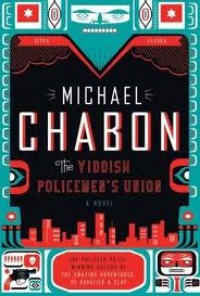Review: The Yiddish Policemen's Union

I liked and disliked different aspects of this book. This is a detective noir-type story, set in an alternate version of Alaska where most of the Jews were resettled after World War II and have built a Yiddish community. Despite the alternate history setting, this doesn’t have any science fiction elements. The alternate history aspect is just there, without explanation. The story opens up with the main character, Detective Meyer Landsman, discovering that somebody has been murdered in the same hotel where he lives.
As you might guess, the book is heavily focused on Jewish culture. I enjoyed that, just as I usually enjoy books that feature a culture outside my personal experience, but I didn’t understand a lot of what was being said in the beginning. There’s a glossary in the back of the book but, by the time I thought to look for it, I was a third of the way into the book and had already figured most of it out for myself long ago. The dictionary on my Kindle was less helpful than usual because most of the words I had trouble with were Yiddish and/or used in a slang context. The translator function has no idea what to do with Yiddish. At one point, my dictionary told me a word being used to mean policeman (latke) was a potato pancake. This may be technically accurate, but I find that policemen and pancakes typically do not do the same types of things in books, and there can be confusion if one mixes the two up.
I don’t read many detective noir books, so I’m far from an expert, but this one seemed to have a lot of the overused themes I associate with them: Our main character is, predictably, told not to investigate this particular murder. He of course continues to investigate it anyway. He makes stupid decisions and puts himself in danger that could have been avoided. He has a lot of personal baggage and a drinking problem. A lot of seemingly-unrelated events “coincidentally” all turn out to be related. And the book has so much tobacco in it that somebody who purchased the physical book could probably roll up the pages and smoke them.
The story had a slow start, and not just because of the initial terminology confusion. Most of the information was relevant eventually, but there was a lot of back story provided in the beginning about characters I didn’t much care about. This book is more character-driven than plot-driven, and I often enjoy those types of books, but I wasn’t that crazy for these characters. Some of them did grow on me, but I was never that invested. The main character in particular was a type I have trouble appreciating, and the general atmosphere in his head, where we live throughout the book, is pretty bleak.
Despite all my negative comments, I did enjoy the story pretty well. Every time I picked it up, my attention would wander and I had trouble getting back into it. Before long, however, I’d find myself several pages further along and caught up in the story again. There’s a good deal of sarcastic humor, and I particularly enjoyed that.
Next Book
Crucible of Gold by Naomi Novik, the 7th book in the Temeraire series.
 3
3
 2
2


